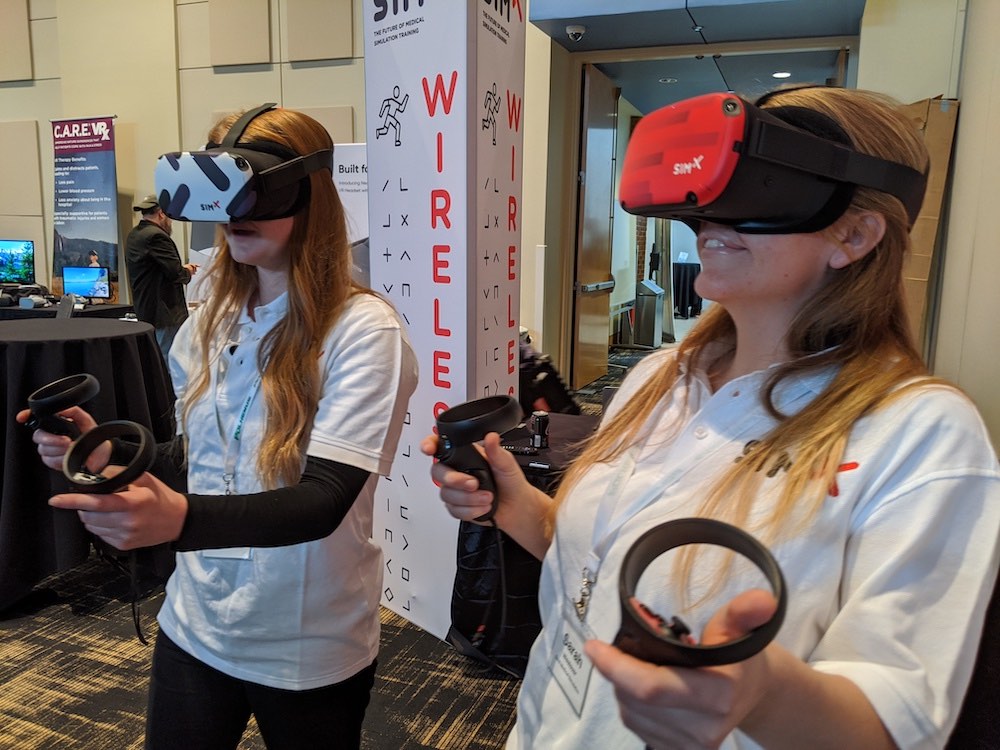4th VR Voice Healthcare Conference Opens at Vanderbilt University Nashville
The VR and Healthcare Global Symposium celebrates its 4th annual event today at Vanderbilt University in Nashville Tennessee, where an estimated 300+ attendees, vendors, entrepreneurs, investors and Virtual Reality experts will come together for two days of XR conversations focused on healthcare. From patient rehab to the latest VR training tools, Bob Fine’s directed VR Voice and the International Virtual Reality and Healthcare Association (IVRHA) is sure to be an exciting event! HealthySimulation.com staff are on hand to cover the event, so follow along here or via @TheVRVoice on twitter.
Supported by numerous Nashville technology venture groups, the VR and Healthcare Global Symposium presents a balanced mix of speakers from academia, healthcare organizations and the virtual reality technology industry. With over 60 speakers will present over 2 days in both a plenary and track breakout format, this is the largest conference in the world dedicated to the development of virtual reality in healthcare.
Supported by the International Virtual Reality Healthcare Association (IVRHA), this year’s keynotes include leading Virtual Reality in Medicine clinician, Dr. Brennan Spiegel from Cedars-Sinai in Los Angeles, as well as Tennessee’s own former U.S. Senate Majority Leader, Dr. William Frist, who is a nationally-acclaimed heart and lung transplant surgeon, former U.S. Senate Majority Leader, and chairman of the Executive Board of the health service private equity firm Cressey & Company.
Sponsored Content:
Attendees will also hear the personal story of Danielle Collins, an early VR applied brain surgery patient, who has built a VR patient focused advocacy group and foundation, and a huge number of other awesome sessions dedicated to VR in medicine.
Opening Plenary by Walter Greenleaf: VR & Healthcare’s Past, Present and Future
Dr. Walter Greenleaf, PhD, Behavioral Neuroscientist and medical technology developer from Stanford University’s Virtual Human Interaction Lab, has over three decades of research and development experience in the field of digital medicine and medical virtual reality technology, Walter is considered a leading authority in the field.
Dr. Greenleaf has designed and developed numerous clinical systems over the last thirty-three years, including products in the fields of: surgical simulation, 3D medical visualization, telerehabilitation, clinical informatics, clinical decision support, point-of-care clinical data collection, ergonomic evaluation technology, automatic sleep-staging systems, psychophysiological assessment, and simulation-assisted rehabilitation technologies, as well as products for behavioral medicine.
Sponsored Content:
His talk covered the digital health revolution, emerging and confluent technologies, overall landscape of XR (Mixed Reality) technologies, neuroscience, history and current status of XR healthcare technologies and future projections. He started by reminding the audience that Virtual Reality in Medicine technologies have existed for decades (with the first VR system available in 1987), not just with the investment by Facebook into the acquisition of Oculus a few years ago. He also shared that digital technologies are revolutionizing healthcare by enabling for a massive amount of data collection never possible before, with new biomarker capture technologies enabling us to better understand the physical and mental states of patients worldwide.
Knowing that 5G connections will surpass one billion by 2023, making the latency for real-time analytics and machine learning will dramatically change the landscape of medicine — especially into the “Internet of Things” (IoT). Dr. Greenleaf suggests there will be simulated models of each patient to model us and provide predictive healthcare decisions. With digital avatars, the opportunities to learn and share globally will be endless.
Dr. Greenleaf suggested the market data suggests a rapid adoption of VR technologies which is much faster than previous disrupting technologies like TV, or even the internet. Virtual Reality developing early-stage companies are covering more than 20 clinical sectors like Patient Education, diabetes, mental health, training, and more — with major investments coming from groups like hp, Cedars-Sinai, UnitedHealth Group and more.
Switching gears into the neuroscience of VR, Dr. Greenleaf noted that the realism of VR is very engaging, and when matched with a very fast feedback loop, provides a unique and powerful tool for both healing and learning. Shifting our behavior is hard to do, but mixed reality technologies can help us to see the outcomes of our decisions today — like a phone call from our future selves! With neuroscience, it is necessary to activity involve the participant, provide feedback, engage and motivate — all of which VR does while providing team training opportunities with cost effective technologies. Dr. Greenleaf noted that we are “wired for narrative stories” which VR is perfect for, enabling: superior retention, improved understanding, context, empathy, engagement and meaning.
Dr. Greenleaf shared that VR support healthcare development in the following areas:
- Clinical skills & surgical Skills
- Interpersonal skills & team training
- Use of Equipment and tools
- Emergency response training
- Facilitation of empathy
- Learning anatomy
- Physiology training
- Patient education
- Objective diagnostic assessments (simulating great heights)
- Behavioral cognitive assessments
- Improving interventions
- Preoperative planning & image guided surgery
- Stroke, TBI and physical / occupational therapy
- Mental health issue identification and treatment
- Pain distraction clinical research and practice
- PTSD and risk avoidance training
- Other phobias, anger management, eating disorders, chronic pain, etc
- Geriatric and palliative care
- Health wellness, supporting mood resilience, habit changing, and more
He noted the Children’s Hospital of LA VR study focusing on pediatric emergency training, which is now a requirement before providers are allowed into the patient care space. Similarly, the BraveHeart 360 camera recorded introduction hospital tour, enables for children to overcome pre procedure anxiety with promising results!
He summarized that we have come along way in the past 30 years and that the future is just beginning! Following this presentation, Dr. Greenleaf sat down with Senator William Frist, MD, who was the first practicing physician elected to the Senate since 1928 representing Tennessee from 1994 -2006. He was elected Majority Leader of the Senate, having served fewer total years in Congress than any person chosen to lead that body in history. His leadership was instrumental in the passage of the 2003 Medicare Modernization Act and the historic PEPFAR legislation that provided life-saving treatment globally to over 12 million people and reversed the spread of HIV/AIDS worldwide.
Currently Dr. Frist serves as an adjunct professor of Cardiac Surgery at Vanderbilt University and clinical professor of Surgery at Meharry Medical College. As a leading authority on healthcare, Senator Frist speaks nationally on health reform, government policy, global health, education reform, and volunteerism. His current board service includes the Robert Wood Johnson Foundation, The Nature Conservancy, Kaiser Family Foundation, Smithsonian Museum of the American Indian, Bipartisan Policy Center, and Nashville Health Care Council. In the private sector, he serves on the boards of Select Medical, Teladoc, AECOM, and others. He also provides a podcast entitled “A Second Opinion” focusing on the macro level topics relevant to healthcare.
The two spoke on the power of digital technologies which are influencing healthcare in new ways daily now, such as upcoming the relevancy of remote telemedicine to assess Coronavirus cases from the safety of a patient’s home — with as much as a 10X cost savings for remote assessment vs brick and mortar. Senator Frist spoke to the importance of policy to support technology in healthcare from both the macro and micro levels.
Other Speakers During the Event Include:
- Char Miller, Associate Professor of Graduate Nursing at Ohio University
- Carrie Love, Producer of Game Research and Immersive Design at Ohio University
- Noah Robinson, Founder and CEO of Very Real Help
- Indira Knight, Creative Technology at Royal College of Art UK
- Greg Dorsainville, Senior Multimedia Developer at NYU Langone Medical Center
- Walter Werzowa, Founder of HealthTunes
- Fern Nibauer-Cohe, Director of Patient Engagement at Penn Medicine
- Devika Patel, Director of the The Better Lab at University of California San Francisco
- Richard Vincent, CEO and Co-Founder of FundamentalVR
- Dr. Jonathan Sherman, Director of Surgical Neuro-oncology of George Washington University
- Vinay Narayan, Vice President of HTC Vive
- Jennifer Esposito, Vice President of Magic Leap
- And many more!
Agenda Sessions Include:
- Virtual Reality and Healthcare: The Past, The Present, and the Future
- Putting The Patient and Doctor Relationship First in Virtual Reality and Healthcare
- Case Study: Patient Engagement with VR at the University of Pennsylvania Cancer Center
- Flight Simulator for Surgery – We Have Life Off!!!
- Case Study: How Mount Sinai and Health Scholars Partnered to Address ACLS Skills Decay Using VR Refresher Training
- Using VR to Teach Social and Life Skills for People with Autism
- Magic Leap: Augmented Reality and Healthcare
- Using VR Cinema to Fight the Opioid Crisis in Ohio: Narcan Training
- Diabetes and Poverty: Social Determinates of Health via Immersive Storytelling
- Using VR Cinema to Create Empathy for Patients with Parkinson’s Disease
- Town Hall Discussion: VR, Healthcare and Investment
- An Overview of the play4REAL Lab at the Yale Center for Health & Learning Games
- Empathy Training and Team Building with VR Cinema
- Augmented Reality for Ultrasound-Guided Surgical Interventions
- Validation in VR and Healthcare: Where Are We? And Where Do We Need to Go?
- Town Hall: Regulatory and Reimbursements in VR and Healthcare
- The Case for Wearables in XR Data Visualization for the Health Industry
- And Many More….
About the IVRHA
The International Virtual Reality and Healthcare Association, or IVRHA, is a member driven organization comprised of entities throughout the healthcare ecosystem, including technology companies, teaching hospitals and universities, as well as healthcare providers and insurance companies. IVRHA’s mission is to facilitate and support the growth of the virtual reality and healthcare industry as this new computing platform impacts healthcare practitioners and patients
Learn More at VR Healthcare 2020’s Website Today!
Lance Baily, BA, EMT-B, is the Founder / CEO of HealthySimulation.com, which he started in 2010 while serving as the Director of the Nevada System of Higher Education’s Clinical Simulation Center of Las Vegas. Lance also founded SimGHOSTS.org, the world’s only non-profit organization dedicated to supporting professionals operating healthcare simulation technologies. His co-edited Book: “Comprehensive Healthcare Simulation: Operations, Technology, and Innovative Practice” is cited as a key source for professional certification in the industry. Lance’s background also includes serving as a Simulation Technology Specialist for the LA Community College District, EMS fire fighting, Hollywood movie production, rescue diving, and global travel. He and his wife live with their two brilliant daughters and one crazy dachshund in Las Vegas, Nevada.
Sponsored Content:






















